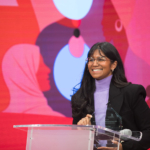Over the last year we have become familiar with the notion of the ‘gender pay gap’. The Economist’s “glass-ceiling index” places Britain below the OECD average, and in 22nd place out of 29. A more nuanced insight is the source of this pay gap. The Economist also states that almost all of the 29% pay gap can be explained by differences in the type of job and level of job between men and women [Economist January 1]. In other words, if men and women did not typically work in different types of jobs stream and if women were able to progress to the same level as men, this gap would virtually disappear. Very little of the difference in salary is driven by different pay for the same job.
Significant progress has been made over the past 20 years around gender equality and there are many positive indicators in terms of attitudes and educational attainment which might make us assume that these differences will rapidly reduce.
New research out this week by WorldSkills UK and The Careers & Enterprise Company challenges that belief. It suggests progress is not inevitable. It finds that our young people have more – not less – gender-conservative views of the world than their parents. This is measured in the types of industries and the levels of pay that our young people associate with men and women – exactly the drivers of our pay-gap today.
We think this research is a wake-up call. When we conducted it, we were testing the opposite hypothesis – that gender-conservative parents were holding their children back. Therefore, we think this finding is significant and counter-intuitive for many of us. It requires us to think deeply about the influences on our young people – what are they seeing, hearing and absorbing – which are leading to these expectations? The research is also a call to action to work hard to ensure that our young men and women are able to reach their individual potential and not be constrained by stereotypes.
The good news is that this research also shows what makes the difference. Providing young people with a wide range of opportunities to learn about their careers and the world of work can make a real difference and even out the inequalities in aspirations between boys and girls. The most commonly accessed type of careers advice is meeting someone from the world of work – and the type of learning that young people prefer is hands on. The research also shows that this type of exposure makes a significant difference, in particular in terms of raising female salary aspirations.
So we know what we can do to start to address this.
At WorldSkills UK and The Careers & Enterprise Company we are committed to providing young people with this exposure to the world of work. We are working together on a programme called Skills Champions – young role models who go back into schools to disrupt stereotypical views of apprenticeships in terms of what they are and who can do them. Already this programme has reached 4500 young people in more than 115 schools and colleges in England over the year. With 73% of young people being inspired and motivated by meeting a Skills Champion.
At The Careers & Enterprise Company we are working with 2000 of the 3500 mainstream secondary schools and FE colleges to increase exposure to the world of work. So far encounters with the world of work among the schools and colleges with which we work has increased by 50%. In addition 380,000 young people have accessed programmes to connect them to employers – mentors, enterprise competitions or other careers activities.
And The Skills Show – delivered by WorldSkills UK – is attended by over 70,000 young people, parents and teachers, to expose the modern workplace and technical career opportunities. With over 70% of young people saying they would consider registering for an apprenticeship as a result of attending the show. While as as result of attending The Skills Show educators (97%) planned to engage in some follow up careers activity with their young people.
We know what works and we are asking employers, schools and colleges to continue to work with us on this. Specifically:
- Working with us to increase employer engagement in schools as Enterprise Advisers working with head teachers to build an employer engagement programme or through directly supporting young people in schools.
- Engaging with the Skills Champions programme
- Getting involved with The Skills Show 2018 where diversity and careers advice will be a major themes


